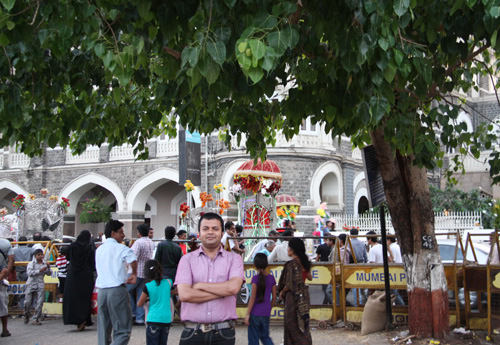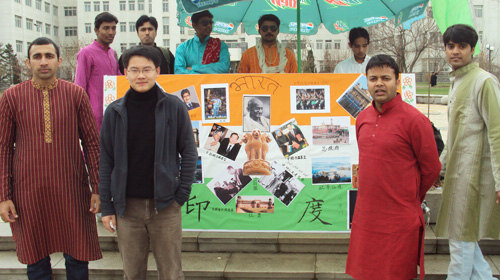|
 |
|
MEDIATING: Sayyid Mohammed Kashif poses under a fig tree in Mumbai, India. The sacred fig, Ficus religiosa, is the same species as the Bodhi Tree beneath which the Sakyamuni Buddha is said to have attained enlightenment after meditating for three days and nights (COURTESY OF LU ANQI) |
Sayyid Mohammed Kashif, 25, is a tour guide in India who can speak Hindi, English, Chinese among a few others. Like most young people, Kashif works hard in hopes of improving his family situation.
He comes from Bodh Gaya in north India, where the Sakyamuni Buddha is said to have attained enlightenment, or bodhi, after meditating under a fig tree for three days and nights. A direct descendant of that very tree, the Bodhi Tree, still exists in Bodh Gaya's Mahabodhi Temple and is one of the four most important pilgrimage sites in Buddhism. However, the poor local living standards forced Kashif's family to leave for Delhi some 12 years ago for its superior medical services, education, and job opportunities.
 |
|
CULTRAL ENVOY: Kashif (second front right) participates in a cultural activity presenting India to Chinese people in Shenyang, northeast China's Liaoning Province (COURTESY OF LU ANQI) |
Kashif spent his undergraduate years in Delhi, majoring in Indian history. During those years, he realized the booming relations between China and India could bring him more opportunities. After graduating in 2008, he studied Chinese in Shenyang, northeast China's Liaoning Province, and took the Chinese name Shi Da. When he returned to Delhi two years later, the employment situation left him with few alternatives outside the tourism industry.
Kashif earns $785 to $942 a month, including tips and commissions during the busy tourism season from November to June. He also works for a trade company flying back and forth between India and China in the low season. He rides a motorcycle, and hopes to buy a car one day. To make payments on a mortgage for an ordinary two-bedroom apartment in Delhi and drive an India-made Tata car would take him five or six years saving.
His biggest dream is to open a school providing free education for disadvantaged children.
Many middle school students in India generally go to government-subsidized public schools at an affordable cost of 10,000 rupees ($180) per year, or to private schools, which are more expensive. But poor rural children are still struggling with malnutrition, and cannot even afford the public schools.
He has applied for a bank loan for start-up capital, but failed, due to a lack of credit since he didn't have enough cumulative paid income tax. With the high housing prices in cities, he plans to ask his friends to run a rural charity school together. But he still wants to guide visitors himself, as before, to earn a better life. |
